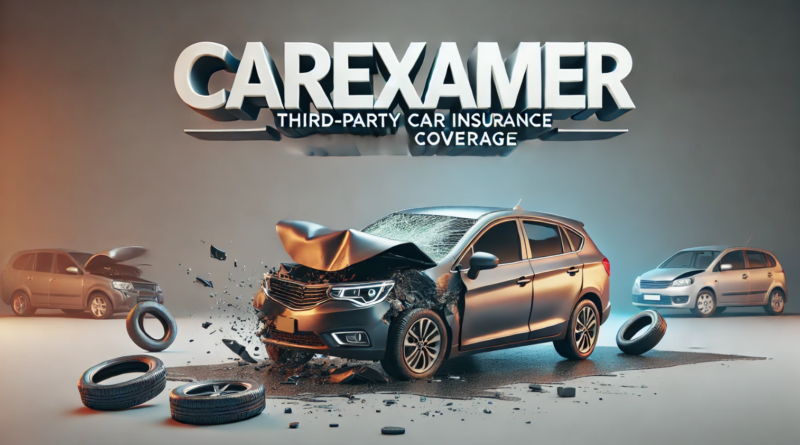Guide What Is Third-Party Car Insurance?
Let’s break it down in simple terms, so you know exactly what you’re getting with third-party car insurance. If you’ve ever shopped around for car insurance, you’ve probably heard about third-party car insurance. It’s one of the most common and affordable options, but what does it actually cover? And is it the right choice for you?
What Is Third-Party Car Insurance?
In a nutshell, third-party car insurance is the basic, no-frills option that covers damage you cause to other people or their property. The “third party” refers to anyone who’s not you (the policyholder) or your insurance company. So if you’re involved in an accident and it’s your fault, your third-party insurance will cover the costs for the other person’s car, property, or any injuries they might have.
But here’s the catch: it doesn’t cover any damage to your own car or your own injuries. That’s why it’s cheaper than more comprehensive policies—it covers the essentials, but not much more.
What Does Third-Party Insurance Cover?
Let’s break down exactly what third-party insurance will pay for:
- Damage to Someone Else’s Vehicle: If you rear-end someone or accidentally hit their parked car, your third-party insurance will cover the cost of repairing or replacing their vehicle.
- Damage to Property: If you crash into someone’s fence, garage, or any other property, third-party insurance covers the cost of the repairs.
- Injuries to Other People: If someone is injured in an accident you caused, third-party insurance will help pay for their medical bills and any compensation claims they make.
- Legal Costs: If the other person sues you for damages, your insurance will cover your legal fees (within limits, of course).
What Isn’t Covered by Third-Party Insurance?
While third-party insurance takes care of the damage you cause to others, it won’t cover:
- Damage to Your Own Car: If you crash your car, you’re on the hook for the repair costs. No help from your insurance here.
- Your Injuries: If you get hurt in an accident, third-party insurance won’t cover your medical bills or any compensation for your injuries.
- Theft or Fire: If your car gets stolen or catches fire, third-party insurance won’t pay to replace or repair it. You’d need a third-party, fire, and theft policy for that kind of protection.
- Extra Perks: Unlike comprehensive policies, you won’t get things like windscreen cover, breakdown assistance, or cover for your personal belongings with third-party insurance.
Who Should Consider Third-Party Car Insurance?
Third-party car insurance can be a great choice for certain types of drivers:
- If You Drive an Older Car: If your car isn’t worth much, paying for comprehensive coverage might not make sense. Third-party insurance is a cost-effective way to stay insured without paying for extra protection you might not need.
- Young or New Drivers: For those just starting out, third-party insurance is often the cheapest option. Since it’s more limited, the premiums are generally lower than more comprehensive plans.
- Drivers on a Budget: If you want to meet the legal requirements for car insurance without breaking the bank, third-party insurance is the most affordable way to do it.
The Pros of Third-Party Car Insurance
- It’s Affordable: The biggest reason people choose third-party insurance is the price. It’s usually cheaper than comprehensive insurance, making it a great option if you’re looking to save some money.
- You’re Legally Covered: In most places, you need at least third-party insurance to drive legally. It’s a simple way to meet that requirement without paying for more than you need.
- Peace of Mind: Even though it’s basic, third-party insurance covers the essentials. If you cause an accident, you won’t be stuck paying for someone else’s repairs or medical bills out of pocket.
The Cons of Third-Party Car Insurance
- No Protection for Your Own Car: If you’re involved in an accident, you’ll have to cover the costs of repairing your own car. This can get expensive, especially if your vehicle is damaged badly.
- Limited Coverage: Third-party insurance only covers other people’s damages, not yours. If your car is stolen or goes up in flames, you won’t be covered.
- Premiums Can Be Higher for Some Drivers: While third-party insurance is usually cheaper, for young or high-risk drivers, the premiums can sometimes be more expensive than you’d expect. It’s worth shopping around and comparing prices.
How Much Does Third-Party Car Insurance Cost?
The cost of third-party insurance depends on a few things, like:
- Your Driving Record: If you have a clean record, your premiums will be lower. But if you’ve had accidents or claims, expect the cost to go up.
- Your Car: Older or less valuable cars usually have lower premiums because they’re cheaper to repair or replace.
- Where You Live: If you live in a busy city or an area with a lot of accidents, your premiums could be higher.
- Your Age: Unfortunately, younger drivers often face higher premiums, even for third-party coverage, due to their lack of experience.
Is Third-Party Insurance Right for You?
Third-party car insurance is a great option if you’re looking to save money and don’t need extensive coverage. If your car isn’t worth a lot or you’re confident that you can cover the cost of your own repairs in case of an accident, third-party insurance is likely the right fit for you. However, if you rely heavily on your car and want more peace of mind, it might be worth considering a more comprehensive policy.
Buying a used VW. Buying used vauxhall, BMW, Jaguar, Ford, Volvo, Range rover, Bentley, Aston Martin, Porsche, Ferrari, Lamborghini, Maserati, Hyundai, Tesla, Honda, Pagani

